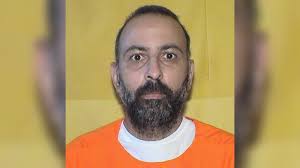Former Doctor Indicted for Naturalization Fraud After Criminal Past Uncovered
 In a chilling narrative that intertwines medical malpractice with a quest for citizenship, Yousif Abdulraouf Alhallaq, a former doctor from Stark County, Ohio, is facing federal indictment for allegedly lying on his U.S. citizenship application. The revelation has resurfaced disturbing details from his past, including his conviction for poisoning a pregnant woman in a harrowing attempt to terminate her pregnancy. This case raises vital questions about the vetting processes for immigration and the safeguards in place for individuals seeking citizenship in the United States.
In a chilling narrative that intertwines medical malpractice with a quest for citizenship, Yousif Abdulraouf Alhallaq, a former doctor from Stark County, Ohio, is facing federal indictment for allegedly lying on his U.S. citizenship application. The revelation has resurfaced disturbing details from his past, including his conviction for poisoning a pregnant woman in a harrowing attempt to terminate her pregnancy. This case raises vital questions about the vetting processes for immigration and the safeguards in place for individuals seeking citizenship in the United States.
Alhallaq, 46, originally from Kuwait and a former Jordanian citizen, entered the United States in 2006 on an H1B visa, which allows U.S. companies to employ foreign workers in specialty occupations. His journey toward permanent residency culminated in 2011 when he became a legal permanent resident. In 2012, he commenced his practice as a medical doctor in Northeast Ohio, seemingly on a path contributing to American society.
However, the events of December 2014 marked a dark turn in Alhallaq’s life. Accusations emerged that he had poisoned a woman who was pregnant with his child, attempting to induce an abortion without her knowledge. The severity of this act led to Alhallaq’s indictment in Stark County in March 2021 on serious charges of attempted murder and felonious assault. Upon pleading guilty in September 2021, he was sentenced to four years in prison, a conviction that would signal severe repercussions for his medical career and personal life.
 Notably, prior to his conviction, in late 2017, Alhallaq applied for U.S. citizenship. During this process, he affirmatively claimed on the application and again verified in a subsequent interview that he had never been involved in any crimes, including attempts to take the life of another. His confident assertions led to approval of his citizenship, effectively cloaking his violent history from the scrutiny of immigration officials.
Notably, prior to his conviction, in late 2017, Alhallaq applied for U.S. citizenship. During this process, he affirmatively claimed on the application and again verified in a subsequent interview that he had never been involved in any crimes, including attempts to take the life of another. His confident assertions led to approval of his citizenship, effectively cloaking his violent history from the scrutiny of immigration officials.
The developments brought forth by the U.S. Attorney’s Office indicate that Alhallaq might have consciously misled authorities during both his application and the interview. As stated in the release from acting U.S. Attorney Carol Skutnik, “The grand jury charges that although Alhallaq knowingly committed acts of attempted murder and felonious assault against his unborn child in 2014, he nonetheless proceeded to sign his naturalization application in 2017.”
Alhallaq’s case shines a spotlight on potential gaps in the immigration vetting process, particularly concerning individuals with violent histories. Critics argue that his ability to gain citizenship despite his criminal actions is a failure of the U.S. immigration system to adequately assess the moral and ethical qualifications of applicants. This incident invites calls for reform in the citizenship application process, ensuring that the backgrounds of applicants are thoroughly vetted to protect the values held by the United States.
As part of the fallout from his criminal past, Alhallaq’s medical license was permanently revoked in January 2022, leading to a significantly altered professional life. Currently, he is incarcerated at the Lake Erie Correctional Institution, with a scheduled release date of August 15, 2025. Following his release, he is expected to be placed on probation for five years, conditional upon compliance with any future legal rulings.
The new federal charges against Alhallaq carry potential consequences, with the possibility of up to 10 years of imprisonment for naturalization fraud. This situation displays the complexities entwined in issues of immigration law, ethical accountability in healthcare professions, and the broader implications of criminal behavior on societal trust.
Alhallaq’s narrative resonates deeply within the community, as it raises fundamental ethical questions about the responsibilities of both immigrants and the U.S. government. It emphasizes the crucial need for rigorous checks to prevent individuals with a history of violent crime from assuming roles that may influence public safety and health.
As Alhallaq’s case unfolds in the legal system, the examination of his actions and the subsequent implications will continue to reverberate through the community and shape ongoing discussions regarding how to bolster the integrity of the naturalization process and protect vulnerable populations from potential abuses. This story serves as a stark reminder of the importance of accountability at all levels, ensuring that the values of justice and safety remain at the forefront of the American immigration landscape.
Sources: